On the role of translated literature in constructing the "new Soviet person": Anglophone fiction in Soviet Latvia of the 1940s
On the role of translated literature in constructing the "new Soviet person": Anglophone fiction in Soviet Latvia of the 1940s
Author(s): Evita BadinaSubject(s): Media studies, Recent History (1900 till today), Latvian Literature, Translation Studies
Published by: Editura Universităţii »Alexandru Ioan Cuza« din Iaşi
Keywords: Latvia; Soviet ideology; 'new Soviet person'; Anglophone literature; the press;
Summary/Abstract: In Latvia, the Soviet regime played a crucial role in the transformation of people's values. Latvians had to be moulded into "New Soviet People" - educated, hardworking, collectivistic, patriotic, loyal to the Communist Party and superior to any other human in the world. A "New Soviet Person" had to be ready to oppose all the threats of capitalism and eventually conquer the world. The research aim is to examine the ways Soviet officials tended to employ literature from ideologically opposite countries to implant 'appropriate' socialist values into society. On the example of British and American fiction presented in the public space of Latvia in the 1940s, the process of constructing a "Soviet identity" is considered. Soviet Latvia periodicals of the 1940s were used as a main data-collecting instrument revealing policies and practices of society moral education carried out by the regime ideologists.
Journal: Eastern Journal of European Studies
- Issue Year: 12/2021
- Issue No: 2
- Page Range: 280-297
- Page Count: 18
- Language: English

